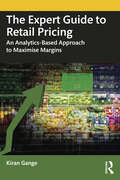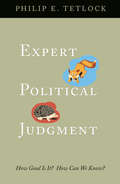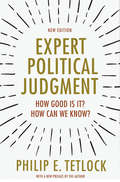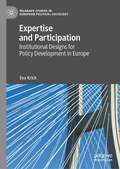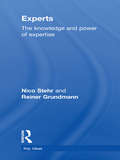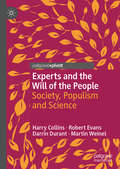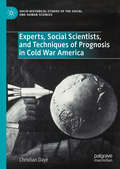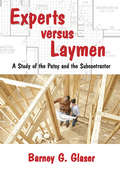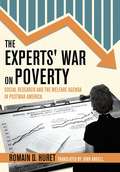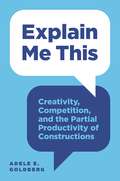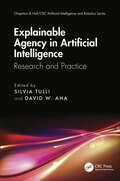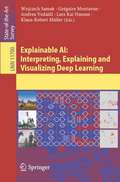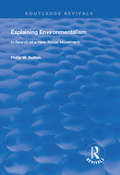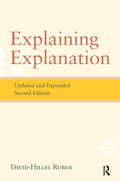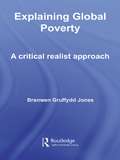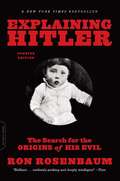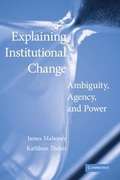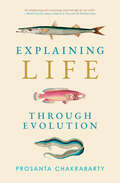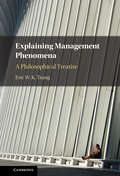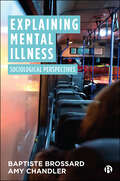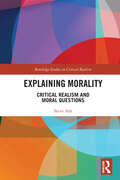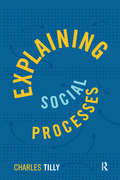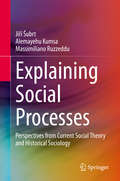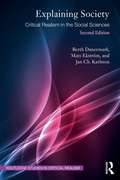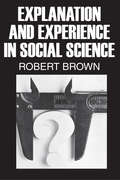- Table View
- List View
The Expert Guide to Retail Pricing: An Analytics-Based Approach to Maximise Margins
by Kiran GangeGoing under the hood of retail strategy, this book provides in-depth coverage of how retailers can leverage the latest in data analytics and technology to improve profitability and customer value through pricing. Retail pricing is not about dollars, pounds or euros, but the value a customer associates with a product, which can and does change over time. To maximize revenues and profits, pricing must be dynamic, strategic, and in today’s hyper-connected and -competitive world, scientific. Using technology to gather customer insights and create data-driven pricing approaches can also enhance the customer experience, improve vendor management, help monitor competitors, and ensure market efficiency – including the much-needed reduction of waste in the food sector. This book uses case studies from around the globe to illustrate the evolution of retailing and offers takeaways with each chapter to enable retailers to manage the future of pricing. Retail and pricing managers, retail sector consultants, and students of sales and marketing will welcome this book’s innovative solutions to one of bricks-and-mortar retailing’s most critical challenges.
Expert Political Judgment
by Philip E. TetlockThe intelligence failures surrounding the invasion of Iraq dramatically illustrate the necessity of developing standards for evaluating expert opinion. This book fills that need. Here, Philip E. Tetlock explores what constitutes good judgment in predicting future events, and looks at why experts are often wrong in their forecasts. Tetlock first discusses arguments about whether the world is too complex for people to find the tools to understand political phenomena, let alone predict the future. He evaluates predictions from experts in different fields, comparing them to predictions by well-informed laity or those based on simple extrapolation from current trends. He goes on to analyze which styles of thinking are more successful in forecasting. Classifying thinking styles using Isaiah Berlin's prototypes of the fox and the hedgehog, Tetlock contends that the fox--the thinker who knows many little things, draws from an eclectic array of traditions, and is better able to improvise in response to changing events--is more successful in predicting the future than the hedgehog, who knows one big thing, toils devotedly within one tradition, and imposes formulaic solutions on ill-defined problems. He notes a perversely inverse relationship between the best scientific indicators of good judgement and the qualities that the media most prizes in pundits--the single-minded determination required to prevail in ideological combat. Clearly written and impeccably researched, the book fills a huge void in the literature on evaluating expert opinion. It will appeal across many academic disciplines as well as to corporations seeking to develop standards for judging expert decision-making.
Expert Political Judgment: How Good Is It? How Can We Know?
by Philip E. TetlockSince its original publication, Expert Political Judgment by New York Times bestselling author Philip Tetlock has established itself as a contemporary classic in the literature on evaluating expert opinion. Tetlock first discusses arguments about whether the world is too complex for people to find the tools to understand political phenomena, let alone predict the future. He evaluates predictions from experts in different fields, comparing them to predictions by well-informed laity or those based on simple extrapolation from current trends. He goes on to analyze which styles of thinking are more successful in forecasting. Classifying thinking styles using Isaiah Berlin's prototypes of the fox and the hedgehog, Tetlock contends that the fox--the thinker who knows many little things, draws from an eclectic array of traditions, and is better able to improvise in response to changing events--is more successful in predicting the future than the hedgehog, who knows one big thing, toils devotedly within one tradition, and imposes formulaic solutions on ill-defined problems. He notes a perversely inverse relationship between the best scientific indicators of good judgement and the qualities that the media most prizes in pundits--the single-minded determination required to prevail in ideological combat. Clearly written and impeccably researched, the book fills a huge void in the literature on evaluating expert opinion. It will appeal across many academic disciplines as well as to corporations seeking to develop standards for judging expert decision-making. Now with a new preface in which Tetlock discusses the latest research in the field, the book explores what constitutes good judgment in predicting future events and looks at why experts are often wrong in their forecasts.
Expertise and Participation: Institutional Designs for Policy Development in Europe (Palgrave Studies in European Political Sociology)
by Eva KrickThis book deals with the role of expertise and public participation in modern governance. It explores the relationship, tensions and compatibility of these increasingly important and partly conflicting sources of legitimacy and authority. By zooming in on the coordinated procedures of environmental policy-making in European consensus systems and by interconnecting theories of democracy, knowledge and science, organisation and decision-making, the author develops institutional solutions to the tensions between epistemic and democratic demands on public policy-making.
Experts: The Knowledge and Power of Expertise (Key Ideas)
by Reiner Grundmann Nico StehrIn this book, Stehr and Grundmann outline the theoretical significance and practical importance of the growing stratum of experts, counsellors and advisors in contemporary society, and claim that the growing spectrum of knowledge-based occupations has led to the pluralisation of expertise. As decision makers in organizations and private citizens, for various reasons, increasingly seek advice from experts, the authors examine the nature of expert activity, and suggest that the role of experts needs to be distinguised from other roles such as professionals, scientists, or intellectuals. Experts, they argue, perform knowledge based activities that mediate between the context of knowledge creation and application. Existing approaches tend to restrict the role of the expert to scientists, or to conflate the roles of professionals with experts. In avoiding such restrictions, this book sets out a framework to understanding the growing role of expertise in a better way. Experts provides thought-provoking discussion that will be of interest to postgraduate students and academics working within the fields of social theory, knowledge, and consumption.
Experts and the Will of the People: Society, Populism and Science
by Harry Collins Robert Evans Darrin Durant Martin WeinelThe rise of populism in the West has led to attacks on the legitimacy of scientific expertise in political decision making. This book explores the differences between populism and pluralist democracy and their relationship with science. Pluralist democracy is characterised by respect for minority choices and a system of checks and balances that prevents power being concentrated in one group, while populism treats minorities as traitorous so as to concentrate power in the government. The book argues that scientific expertise – and science more generally -- should be understood as one of the checks and balances in pluralist democracies. It defends science as ‘craftwork with integrity’ and shows how its crucial role in democratic societies can be rethought and that it must be publicly explained. This book will be of value to scholars and practitioners working across STS as well as to anyone interested in decoding the populist agenda against science.
Experts, Social Scientists, and Techniques of Prognosis in Cold War America (Socio-Historical Studies of the Social and Human Sciences)
by Christian DayéThis book describes how Cold War researchers used expert opinions to construct foreknowledge of geopolitical relevance. Focusing on the RAND Corporation, an American think tank with close relations to the armed forces, Dayé analyses the development of two techniques of prognosis, the Delphi technique and Political Gaming. Based on archival research and interviews, the chapters explore the history of this series of experiments to understand how contemporary social scientists conceived of one of the core categories of the Cold War, the expert, and uncover the systematic use of expert opinions to craft prognoses. This consideration of the expert’s role in Cold War society and what that can tell us about the role of the expert today will be of interest to students and scholars across the history of science, the sociology of knowledge, future studies, the history of the Cold War, social science methodology, and social policy.
Experts Versus Laymen: A Study of the Patsy and the Subcontractor
by Barney Glaser"This book studies the relationship and balance of power between experts and laymen. It is rooted in the author's analysis of customer and contractor interactions in the housing industry, but relevant to other kinds of expert-layman relationships. Many of the conflicts between customer and contractor noted by the author also occur in lawyer-client, student-teacher, and doctor-patient relations.The author's research is structured around three core categories pertaining to experts' relations with laymen: choosing experts, power symmetry, and what he calls ""elsewhereism."" The first category has to do with seeking experts, finding them, referrals, and judging whether or not to use experts. Power symmetry concerns the inherent imbalance of power between an expert and a layman. ""Elsewhereism"" focuses on the constant competition that laymen face with unseen others in claiming the time and services of an expert.Experts versus Laymen broadens the analysis of expert-layman phenomena far beyond similar studies. It examines processes of bidding, gaining information, inspecting and evaluating work, winning trust, bargaining over costs, and determining who has situational control. This book discusses not only the contracting process in the housing industry, but far more important a world of power and domination in expert-laymen relationships."
The Experts' War on Poverty: Social Research and the Welfare Agenda in Postwar America (American Institutions and Society)
by Romain D. HuretIn the critically acclaimed La Fin de la Pauverté?, Romain D. Huret identifies a network of experts who were dedicated to the post-World War II battle against poverty in the United States. John Angell's translation of Huret's work brings to light for an English-speaking audience this critical set of intellectuals working in federal government, academic institutions, and think tanks. Their efforts to create a policy bureaucracy to support federal socio-economic action spanned from the last days of the New Deal to the late 1960s when President Richard M. Nixon implemented the Family Assistance Plan. Often toiling in obscurity, this cadre of experts waged their own war not only on poverty but on the American political establishment. Their policy recommendations, as Huret clearly shows, often militated against the unscientific prejudices and electoral calculations that ruled Washington D.C. politics.The Experts' War on Poverty highlights the metrics, research, and economic and social facts these social scientists employed in their work, and thereby reveals the unstable institutional foundation of successive executive efforts to grapple with gross social and economic disparities in the United States. Huret argues that this internal war, coming at a time of great disruption due to the Cold War, undermined and fractured the institutional system officially directed at ending poverty. The official War on Poverty, which arguably reached its peak under President Lyndon B. Johnson, was thus fomented and maintained by a group of experts determined to fight poverty in radical ways that outstripped both the operational capacity of the federal government and the political will of a succession of presidents.
Explain Me This: Creativity, Competition, and the Partial Productivity of Constructions
by Adele E. GoldbergWhy our use of language is highly creative yet also constrainedWe use words and phrases creatively to express ourselves in ever-changing contexts, readily extending language constructions in new ways. Yet native speakers also implicitly know when a creative and easily interpretable formulation—such as “Explain me this” or “She considered to go”—doesn’t sound quite right. In this incisive book, Adele Goldberg explores how these creative but constrained language skills emerge from a combination of general cognitive mechanisms and experience.Shedding critical light on an enduring linguistic paradox, Goldberg demonstrates how words and abstract constructions are generalized and constrained in the same ways. When learning language, we record partially abstracted tokens of language within the high-dimensional conceptual space that is used when we speak or listen. Our implicit knowledge of language includes dimensions related to form, function, and social context. At the same time, abstract memory traces of linguistic usage-events cluster together on a subset of dimensions, with overlapping aspects strengthened via repetition. In this way, dynamic categories that correspond to words and abstract constructions emerge from partially overlapping memory traces, and as a result, distinct words and constructions compete with one another each time we select them to express our intended messages.While much of the research on this puzzle has favored semantic or functional explanations over statistical ones, Goldberg’s approach stresses that both the functional and statistical aspects of constructions emerge from the same learning mechanisms.
Explainable Agency in Artificial Intelligence: Research and Practice (Chapman & Hall/CRC Artificial Intelligence and Robotics Series)
by Silvia Tulli David W. AhaThis book focuses on a subtopic of explainable AI (XAI) called explainable agency (EA), which involves producing records of decisions made during an agent’s reasoning, summarizing its behavior in human-accessible terms, and providing answers to questions about specific choices and the reasons for them. We distinguish explainable agency from interpretable machine learning (IML), another branch of XAI that focuses on providing insight (typically, for an ML expert) concerning a learned model and its decisions. In contrast, explainable agency typically involves a broader set of AI-enabled techniques, systems, and stakeholders (e.g., end users), where the explanations provided by EA agents are best evaluated in the context of human subject studies. The chapters of this book explore the concept of endowing intelligent agents with explainable agency, which is crucial for agents to be trusted by humans in critical domains such as finance, self-driving vehicles, and military operations. This book presents the work of researchers from a variety of perspectives and describes challenges, recent research results, lessons learned from applications, and recommendations for future research directions in EA. The historical perspectives of explainable agency and the importance of interactivity in explainable systems are also discussed. Ultimately, this book aims to contribute to the successful partnership between humans and AI systems. Features: • Contributes to the topic of explainable artificial intelligence (XAI) • Focuses on the XAI subtopic of explainable agency • Includes an introductory chapter, a survey, and five other original contributions
Explainable AI: Interpreting, Explaining and Visualizing Deep Learning (Lecture Notes in Computer Science #11700)
by Klaus-Robert Müller Grégoire Montavon Wojciech Samek Andrea Vedaldi Lars Kai HansenThe development of “intelligent” systems that can take decisions and perform autonomously might lead to faster and more consistent decisions. A limiting factor for a broader adoption of AI technology is the inherent risks that come with giving up human control and oversight to “intelligent” machines. For sensitive tasks involving critical infrastructures and affecting human well-being or health, it is crucial to limit the possibility of improper, non-robust and unsafe decisions and actions. Before deploying an AI system, we see a strong need to validate its behavior, and thus establish guarantees that it will continue to perform as expected when deployed in a real-world environment. In pursuit of that objective, ways for humans to verify the agreement between the AI decision structure and their own ground-truth knowledge have been explored. Explainable AI (XAI) has developed as a subfield of AI, focused on exposing complex AI models to humans in a systematic and interpretable manner. The 22 chapters included in this book provide a timely snapshot of algorithms, theory, and applications of interpretable and explainable AI and AI techniques that have been proposed recently reflecting the current discourse in this field and providing directions of future development. The book is organized in six parts: towards AI transparency; methods for interpreting AI systems; explaining the decisions of AI systems; evaluating interpretability and explanations; applications of explainable AI; and software for explainable AI.
Explaining Environmentalism: In Search of a New Social Movement
by Philip W. SuttonThis title was first published in 2000: The author examines those current theories which purport to explain the emergence and character of 'new' social movements in the 'advanced' industrial societies since the 1960s. In particular, it sets out to test the efficacy of these explanations in relation to the history of the environmental movement in Britain. The book breaks new ground in bringing together both short-term and the more historically orientated long-term explanations into a single volume, thus providing an invaluable resource for students of social movements. Its critical exposition of major theories also points to the need for a more developmental approach which seeks to connect old and new movement forms, thus allowing for a more balanced evaluation of the potential of the environmental movement to bring about significant social change.
Explaining Explanation (Problems Of Philosophy Ser.)
by David-Hillel RubenThis second edition of David-Hillel Ruben's influential and highly acclaimed book on the philosophy of explanation has been revised and expanded, and the author has made substantial changes in light of the extensive reviews the first edition received. Ruben's views on the place of laws in explanation has been refined and clarified. What is perhaps the central thesis of the book, his realist view of explanation, describing the way in which explanation depends on metaphysics, has been updated and extended and engages with some of the work in this area published since the book's first edition.
Explaining Global Poverty: A Critical Realist Approach (Routledge Studies in Critical Realism)
by Branwen Gruffydd JonesThe twenty-first century is characterized by extremes of poverty and wealth, of scarcity and abundance. The vast inequalties of wealth distribution between the developed west and the impoverished developing world is a complex problem. This book recognises that Africa in particular has manifested this global disgrace and symbolizes the nature of poverty to the western world. In order to truly emancipate the poverty stricken around the world we must necessarily understand the reasons for its existence. In a departure from traditional critical realist theory, Gruffydd-Jones argues the benefits of reassessing the relevance of objective inquiry and emphasizes its primacy over normative theory in the battle to truly understand the reasons for the African crisis. This approach brings us a book of real relevance for inequality in the modern world and gives us an important platform from which to move forwards in the fight against poverty.
Explaining Hitler: The Search for the Origins of His Evil, updated edition
by Ron RosenbaumIn Explaining Hitler, Ron Rosenbaum investigates the meanings and motivations people have attached to Hitler and his crimes against humanity. What does Hitler tell us about the nature of evil? In often dramatic encounters, Rosenbaum confronts historians, scholars, filmmakers, and deniers as he skeptically analyzes the key strains of Hitler interpretation. A balanced and thoughtful overview of a subject both frightening and profound, this is an extraordinary quest, an expedition into the war zone of Hitler theories, "a provocative work of cultural history that is as compelling as it is thoughtful, as readable as it is smart” (New York Times). First published in 1998 to rave reviews, Explaining Hitler became a New York Times-bestseller. This new edition is an update of that classic and a critically important contribution to the study of the twentieth century’s darkest moment.
Explaining Institutional Change: Ambiguity, Agency, and Power
by James Mahoney Kathleen ThelenThis book contributes to emerging debates in political science and sociology on institutional change. Its introductory essay proposes a new framework for analyzing incremental change that is grounded in a power-distributional view of institutions and that emphasizes ongoing struggles within but also over prevailing institutional arrangements. Five empirical essays then bring the general theory to life by evaluating its causal propositions in the context of sustained analyses of specific instances of incremental change. These essays range widely across substantive topics and across times and places, including cases from the United States, Africa, Latin America, and Asia. The book closes with a chapter reflecting on the possibilities for productive exchange in the analysis of change among scholars associated with different theoretical approaches to institutions.
Explaining Life through Evolution
by Prosanta ChakrabartyA broad overview of the science of evolution, and why understanding it matters in our everyday lives.Explaining Life through Evolution tells the origin story of life on this planet and how we arrived at the tremendous diversity among organisms that we see around us today. Prosanta Chakrabarty explains evolution in a concise, accessible, and engaging way, emphasizing the importance of understanding evolution in everyday contemporary life. Weaving his own lived experience among discussions of Darwin and the origins of evolutionary thought, Chakrabarty also covers key concepts to our understanding of our current condition, including mutation; the spectrum of race, sex, gender, and sexuality; the limitations of ancestry tests; and the evolution of viruses like SARS-CoV-2, the virus at the heart of the COVID-19 pandemic.Offering a contemporary update to classic popular evolution books by Stephen Jay Gould, Jerry Coyne, and others, Explaining Life through Evolution is not only an illuminating read, but also an essential guide to the kind of scientific literacy that we need in order to face the challenges of our collective future.
Explaining Management Phenomena: A Philosophical Treatise
by Eric W. TsangOne key objective of management research is to explain business phenomena. Yet understanding the nature of explanation is essentially a topic in philosophy. This is the first book that bridges the gap between a technical, philosophical treatment of the topic and the more practical needs of management scholars, as well as others across the social sciences. It explores how management phenomena can be explained from a philosophical perspective, and renders sophisticated philosophical arguments understandable by readers without specialized training. Covering virtually all the major aspects of the nature of explanation, this work will enhance empirical and theoretical research, as well as approaches combining the two. With many examples from management literature and business news, this study helps scholars in those fields to improve their research outcomes.
Explaining Mental Illness: Sociological Perspectives
by Baptiste Brossard Amy ChandlerHow can sociology explain the emergence of mental disorders in societies or individuals? This authoritative book makes a case for the renewal of the sociology of mental illness, proposing a reorganisation of this field around four areas: social stratification, stress, labelling and culture. Drawing on case studies from a range of global contexts, the book argues that current research focuses on identifying ‘social factors’, leaving the question of causality to psychiatry, while significant critical perspectives remain untapped. The result is an unprecedented resource that maps the current state of sociology of mental health, providing an invigorating manifesto for its future.
Explaining Morality: Critical Realism and Moral Questions (Routledge Studies in Critical Realism)
by Steve AshAdopting a critical realist approach to morality, this book considers morality as an aspect of social reality, enquiring into the nature of moral agency and asking whether we can legitimately argue for a specific moral position and whether moral positions can be understood to apply universally. Drawing on the thought of Bhaskar, Collier and Sayer, it explores a series of ontological questions about morality, shedding light on the ways in which critical realism can be used to address them, ultimately responding to the question of whether critical realism and the moral theories that have been produced through its use can provide an explanation of morality as a feature of reality. Through a synthesis of realist thought, the author develops a comprehensive theoretical understanding of morality that can be tested for its explanatory power through subsequent practical research. As such, it will appeal to scholars of philosophy and social science with interests in critical realism, ontology and meta-ethics.
Explaining Social Processes
by Charles TillyBuilt upon decades of experience at the frontiers of history and social science, Charles Tilly's newest book offers innovative methods and approaches that are applicable in a wide range of disciplines: politics, sociology, anthropology, history, economics, and more. The book covers approaches to analysis ranging from interpersonal exchanges to world-historical changes-economic, political, and social. He shows how a thoroughgoing relational account of social processes, coupled with the careful identification of causal mechanisms, illuminates variation and change in the ways people live at the small scale and the large.
Explaining Social Processes: Perspectives from Current Social Theory and Historical Sociology
by Jiří Šubrt Alemayehu Kumsa Massimiliano RuzzedduThis textbook considers understanding social processes to be the main task of sociology. From this perspective its authors demonstrate and explain problems which they consider to be crucial for contemporary social science. These are topics of a theoretical and epistemological nature, which are nevertheless closely connected with social development and issues arising from it. The book moves from the more general theoretical questions and dilemmas raised by key social thinkers, such as those connected with the concepts of actor, agency, institutions, structures and systems. It then leads to theoretical reflections on long-term developmental processes associated with the phenomena of power and life in current societies, including globalization, identities, migration, etc. It provides a comprehensive approach to the essential questions of sociology. Lucidly written and including the latest sociological perspectives, this book will find wide appeal among social science students and researchers, and is also for the socially aware general reader.
Explaining Society: Critical Realism in the Social Sciences (Routledge Studies in Critical Realism)
by Berth Danermark Mats Ekström Jan Ch. KarlssonFully revised, with an updated bibliography and new, relevant illustrative examples based on work inspired by critical realism, this new edition of Explaining Society constitutes an up-to-date resource connecting methodology, theory, and empirical research. Including discussions of more recent scholarship in the field which connects critical realism with interdisciplinary research, this second edition also clarifies concepts – such as retroduction and retrodiction – so as to render them consistent with developments within critical realism, which are covered in a new chapter. An accessible account of the nature of society and social science, together with the methods used to study and explain social phenomena, Explaining Society will appeal to scholars of sociology, philosophy, and the social sciences more broadly.
Explanation and Experience in Social Science
by Robert BrownAccording to their critics, social scientists rarely ask the right questions and cannot provide satisfactory answers even to the questions they ask themselves. Social scientists often discuss the nature of knowledge in their fields with a notable lack of clarity. Explanation and Experience in Social Science by Robert Brown dispels the confusion with cogency and wit; it is a systematic, sensible, and lucid analysis of the nature of the explanations put forward by social scientists.Explanation-making is first distinguished from "describing" and "reporting," and then classified into different types, based on different kinds of information used. The greater part of the book consists in discussion and examination of these types of explanation and their relationships, in which the usefulness and limitations of each are assessed. An extraordinary variety of examples from contemporary work in all the social sciences is used, including the fields of sociology, anthropology, psychology, history, demography, political science. and economics. The author makes it clear that good social explanation is possible and that it conforms to the requirements of all good scientific explanation.Explanation and Experience in Social Science is of interest to the practicing scientist--in fact--it is a must-have for any personal or public library with collections in the social sciences. Most studies in the philosophy of the sciences, natural and social, fall into two distinct groups: those written by philosophers for other philosophers and those produced by scientists for their fellow-scientists. The aim of this book is to discuss questions of philosophical interest as they come to be imbedded in the work of social scientists.
